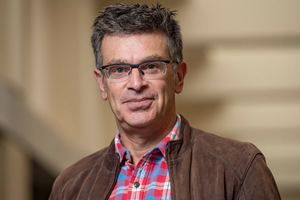
Researchers can better influence international mediation policy and practice by ensuring that their research helps policymakers address specific problems.
Keough School professor Laurie Nathan shared this key finding in a recent journal article published in the September issue of International Affairs. Nathan’s work provides guidance for mediation researchers who hope to bridge the gap between the academic and policy communities and ultimately inform policymakers’ deliberations and interventions.
“Researchers who wish to have a direct impact on mediation policy are well advised to view the policymakers as customers and to discern and meet their knowledge requirements,” said Nathan, who serves as mediation program director for the Keough School’s Kroc Institute for International Peace Studies and professor of the practice of mediation.
Because mediation policymakers take most seriously the research they have commissioned and paid for, it’s crucial to focus on their needs, Nathan said. Policymakers commission researchers to produce reports that have a utilitarian orientation, he said, helping them to meet their objectives or solve a problem.
This means taking the time to identify the issues policymakers hope to address and the types of research that resonate with them. Importantly, Nathan said, this approach does not mean compromising the integrity of research to reinforce pre-existing views, but rather applying high-quality scholarship in a targeted fashion to help organizations fill policy gaps and modify existing policies.
“As an international mediation researcher, you can influence policy and practice through a deliberate, problem-solving approach,” Nathan said. “Policymakers are not looking for ‘dumbed down’ mediation research. Instead, they should be understood as sophisticated clients who are looking for a particular kind of research. ”
For instance, Nathan found that mediation policymakers prefer problem-solving research that can either help them address specific conflicts or enhance their operational effectiveness. Methodologically, they prefer comparative case studies that include interviews with mediators rather than quantitative analysis. In addition, they want research that focuses on a specific problem, avoids undiplomatic criticism, and advances proposals that are politically and economically feasible.
The article draws on Nathan’s extensive mediation experience. He has participated in high-level peacemaking efforts in Africa and has worked as a senior advisor on mediation and related issues with the United Nations, the African Union, the European Union, the Intergovernmental Authority on Development, and the Organisation for Economic Co-operation and Development. In addition, he has worked with the governments of Germany, Mozambique, South Africa, Swaziland, Switzerland, The Netherlands, and the United Kingdom.
Originally published at keough.nd.edu.